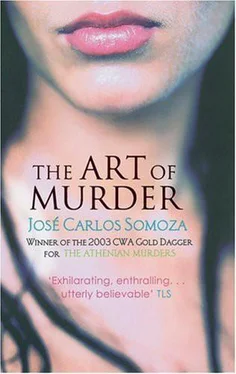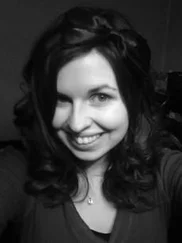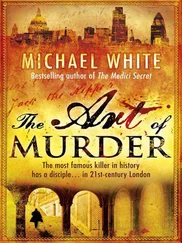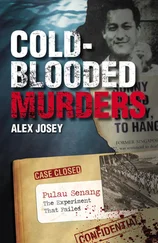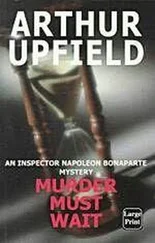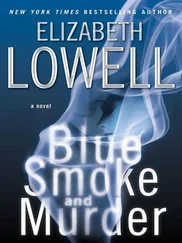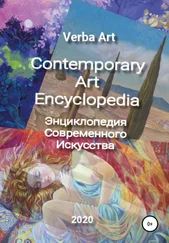Jose Somoza - Art of Murder
Здесь есть возможность читать онлайн «Jose Somoza - Art of Murder» весь текст электронной книги совершенно бесплатно (целиком полную версию без сокращений). В некоторых случаях можно слушать аудио, скачать через торрент в формате fb2 и присутствует краткое содержание. Жанр: Триллер, на английском языке. Описание произведения, (предисловие) а так же отзывы посетителей доступны на портале библиотеки ЛибКат.
- Название:Art of Murder
- Автор:
- Жанр:
- Год:неизвестен
- ISBN:нет данных
- Рейтинг книги:4 / 5. Голосов: 1
-
Избранное:Добавить в избранное
- Отзывы:
-
Ваша оценка:
- 80
- 1
- 2
- 3
- 4
- 5
Art of Murder: краткое содержание, описание и аннотация
Предлагаем к чтению аннотацию, описание, краткое содержание или предисловие (зависит от того, что написал сам автор книги «Art of Murder»). Если вы не нашли необходимую информацию о книге — напишите в комментариях, мы постараемся отыскать её.
Art of Murder — читать онлайн бесплатно полную книгу (весь текст) целиком
Ниже представлен текст книги, разбитый по страницам. Система сохранения места последней прочитанной страницы, позволяет с удобством читать онлайн бесплатно книгу «Art of Murder», без необходимости каждый раз заново искать на чём Вы остановились. Поставьте закладку, и сможете в любой момент перейти на страницу, на которой закончили чтение.
Интервал:
Закладка:
In fact, Van Hoore himself had wondered what the exact reason was for all the additional security measures: this was the first time he had been asked to go through these physical tests before getting in. Rita had not liked it any more than he had, and had even got annoyed with the agents who were blocking the way. Why hadn't Miss Wood told them anything about it? What did the change in the shifts for the recovery and supervision personnel mean? Van Hoore had a suspicion that the withdrawal of the Maestro's works in Europe had something to do with all this, but did not dare speculate what exactly it meant. Above all, he was hurt that he was not yet important enough to be let into the secret. 'They don't trust us,' he said.
Rita van Dorn, feet up on the desk while she stirred a cup of steaming coffee in a plastic cup, looked over at him in an offhand manner, then went on staring at the screens.
17.50.
A technician from the Art division held the umbrella aloft as Van Tysch climbed into the limousine. Stein was sitting waiting for him. Van Tysch's secretary, Murnika de Verne, was in front beside the driver. Journalists and cameramen thronged behind the security barrier, but the Maestro had not answered any of their questions. 'He's tired and does not want to make any statement,' his entourage said. Benoit, Nellie Siegel and Franz Hoffmann would be delighted to become prophets for a few minutes, and reveal the words of God for the microphones, but the Maestro had to leave. The car door closed. The driver – smart, blond-haired, wearing sunglasses – aimed for one of the exits the police had cleared. An agent allowed them out. His oilskin was gleaming in the rain.
Van Tysch looked back one last time at the Tunnel, then turned to the front. Stein put a hand on his shoulder. He knew Van Tysch detested any show of affection, but he was doing it for himself rather than the Maestro: he needed the other man to understand to what extent he had obeyed him, all the sacrifices he had made. And how many he still had to make, galismus. 'It's finished, Bruno. Finished.' 'Not yet, Jacob. There's still something to be done.' 'Fuschus, I swear that… you could say it's already done.' 'You might say it, but it's not'
Stein thought of a possible reply. This was how it had always been: Van Tysch was the eternal question, and he had to find the replies. He leaned back in his seat and tried to relax. Impossible. The great painter was as distant and inscrutable as the works of art he created. Next to him, Stein always felt a bit like Adam in the Garden of Eden after he had disobeyed God, with a certain transparent sense of shame. Any silence before Van Tysch contained an implicit recognition of guilt. It was a really unpleasant feeling. But what did that matter? Stein had spent twenty years of his life watching the Maestro transform human bodies into impossible things, and changing the world. He had enough material to write a book, and one day he would. But he still felt he did not know him any better than the rest of the world. If Van Tysch was a dark ocean, he had simply been a dyke to dam it, an electric power station which could change the extraordinary torrent into gleams of gold. The Maestro needed him, would go on needing him. Up to a point. Just then, a phantom reared up in the front seat.
Murnika de Verne had turned her head and was regarding Stein through the tousled curtain of her jet-black hair. Stein looked away from the empty, lifeless eyes. He knew very well that it was not Murnika staring at him, but the Maestro. Murnika de Verne was Van Tysch to an extent that no one, except Stein, could suspect. The Maestro had painted her like this, with that wild look of hers.
Murnika kept staring at him, her anxious mouth hanging open like a starving dog's. She seemed to reproach him for something, but also to want to alert him.
The car glided on through the darting rain. Her fixed stare disturbed him.
'Fuschus, Bruno, don't you believe me?' he said to defend himself. ‘I swear I'll take care of everything. Trust me. Everything will be fine.'
He was talking to Murnika, but his words were intended for Van Tysch. He was making the same mistake a spectator sometimes makes when he believes the eyes of a painting are following him, or when a ventriloquist's dummy addresses him in the middle of an act. But in this case, it was Van Tysch who seemed like the dummy. Murnika de Verne appeared horribly alive and painted. She stared at him for a moment longer, then the life went out of her and she turned back to face the front of the car.
Stein drew a deep breath.
The windscreen wipers tussled with the rain. The only noise Stein could hear was this ticking like a clock (or a pendulum, or a paintbrush) as the limousine sped along the motorway towards Schiphol.
'Everything will be fine, Bruno,' Stein repeated.
18.35.
'We met at school in Edenburg,' Victor Zericky explained. 'My family is from here. Bruno only had his father, who was born in Rotterdam and who probably told him, among many other things, that there was nothing to be done here.'
Zericky was a tall, strong-looking man with blond hair going white. He looked like a well-intentioned man for whom things had not always gone as he had wished. Yet there was something about the way he screwed up his eyes when he talked that suggested there might be some hidden secret, some forbidden room, some distant family curse on him. His house was as cramped as it appeared from outside, and smelt of books and solitude. Half an hour earlier, when he returned after his long walk along the Geul with his dog and was showing Miss Wood in, he had confessed that his wife had left him because she could not bear either of these things. 'Neither books nor solitude,' he said with a laugh. But that did not mean he lived like a hermit, far from it: he went out a lot, was sociable, and had his friends. And he loved to discover nature on walks with his dog.
Miss Wood explained who she was, and gave a pardal account of why she was there. She said she wanted to know more about the man whose works she was protecting, which was reasonable, and Zericky nodded, seeming to accept the excuse. Miss Wood launched into an entertaining monologue about the 'tremendous difficulty in finding the real Van Tysch' in the numerous books written about him, which had made her determined to get to the bottom of the problem and interview his great childhood friend. 'Tell me everything you remember,' she asked him, 'even if you don't think it's important.'
Zericky narrowed his eyes. Perhaps he suspected a deeper reason behind Miss Wood's visit, but he did not seem to want to discover what that might be. In fact, he was flattered by her request. It was obvious he liked to talk, and he did not often have the opportunity. He spoke first about himself: he gave classes in a school in Maastricht, although the previous year he had asked for leave in order to catch up on all his unfinished projects. He had published several books on the history of south Limburg, and at present was gathering material for a definitive study on Edenburg. Then he began to tell her about Van Tysch. He had got up to fetch a grimy folder from his bookshelves. In it were a pile of photographs. He passed some of them to Miss Wood. 'At school he was incredible. Look.'
It was a typical school form photograph. The children's heads shone white and round like so many pinheads. Zericky leaned over Miss Wood's shoulder.
'That one's me. And this is Bruno. He was very beautiful. It took your breath away just to look at him, whether you were a boy or a girl. His eyes shone with an inexhaustible gleam. His jet-black hair, inherited from his Spanish mother, his plump lips and thick black eyebrows that looked as if they had been drawn on with ink, gave him the harmonious look of an ancient god… That's how I remember him. But it was more than just beauty… how can I explain it?… He was like one of his paintings… there was something that went beyond what you can see. There was nothing for it but to bow at his feet. And he loved that. He enjoyed directing us, giving us orders. He was born to create things with others.'
Читать дальшеИнтервал:
Закладка:
Похожие книги на «Art of Murder»
Представляем Вашему вниманию похожие книги на «Art of Murder» списком для выбора. Мы отобрали схожую по названию и смыслу литературу в надежде предоставить читателям больше вариантов отыскать новые, интересные, ещё непрочитанные произведения.
Обсуждение, отзывы о книге «Art of Murder» и просто собственные мнения читателей. Оставьте ваши комментарии, напишите, что Вы думаете о произведении, его смысле или главных героях. Укажите что конкретно понравилось, а что нет, и почему Вы так считаете.
